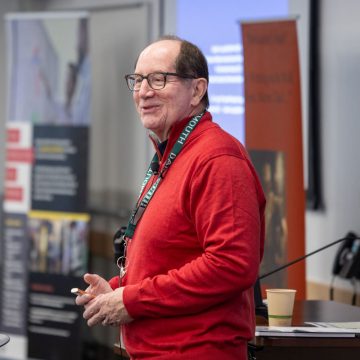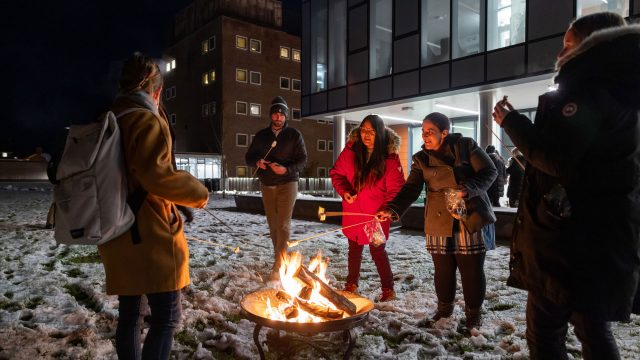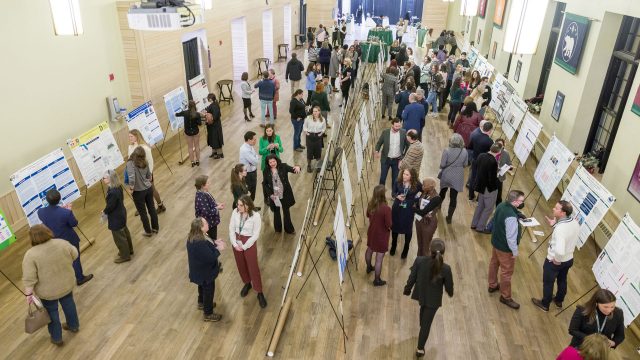Hybrid MPH Students Return to Campus for December Session
Written by Timothy Dean
Last week, candidates enrolled in Geisel’s Hybrid Master of Public Health (MPH) program returned to campus to take part in their December Intensive sessions. The MPH program’s hybrid format includes a 22-month, on-line curriculum with three week-long, intensive sessions on campus each year.
The December phase of the program—which includes formal learning sessions (such as course launches), longitudinal courses (taught throughout the year), guest speakers, networking opportunities, and socialization events—kicked off on Monday morning at Kellogg Hall with an engaging and inspiring talk by internationally known infectious disease specialist Daniel Lucey D’77 MED ‘82, MPH, FIDSA, FACP, one of three guest speakers during the week.

In his 90-minute talk, entitled “People, Policies, and PanEpidemics,” Lucey shared reflections from fighting epidemics over his 40-plus year career—which has included responding to outbreaks overseas involving Ebola, MERS, SARS, HIV, H5N1, Zika, Yellow Fever, and pneumonic plague. He urged the students to “stay humble but be skeptical,” emphasizing that, “What’s coming next is already here, we just haven’t recognized it yet.
“For me, it’s been very important to go to the outbreaks, to work with colleagues on the ground, and talk and share information with the people who are there,” said Lucey, who is a clinical professor of medicine at Geisel, anthropology research associate at the Smithsonian Museum of Natural History, and member of the Infectious Diseases Society of America Global Health Committee. “Remember, if you want to receive something of value, be ready to offer something of value.”
In addition to their curriculum sessions and coursework, many students participated in social activities throughout the week—including S’mores and a fire on the Life Sciences lawn and tours of the Baker Library Bell Tower, which offers breathtaking views of the Dartmouth campus—with several reflecting on their on-campus experiences.

“In two years, we have 24 days to build connections with our cohort in person,” said first-year student Brieanna Gerner. “In just eight days, I have built relationships with people who inspire and challenge me to grow. I am eagerly awaiting the next time I get to see everyone and share special moments like making S’mores by the fire.”
“To be able to take the experiences from these intensive weeks back home to Virginia to impact the patients for whom I care is just remarkable,” said Marie Skoczlas, a member of the first-year cohort. “Equally important are the social activities—having the opportunity to share our personal and professional experiences in an informal setting set the landscape for developing lifelong friendships with some of the most caring people I have ever had the privilege of meeting.”
“This intense, in-person week left me feeling greatly energized and further connected to colleagues and new friends,” said first-year student Jan Castilhos Franca. “I think it’s important that the program includes these weeks, bringing different expertise, experience, and backgrounds together to exchange on today’s many devastating health inequities. It makes such a difference to discuss these challenges in person, during class and outside the classrooms.”
On Wednesday evening, in one of the highlights of the week, the program’s cohort of 42 second-year students got to share the Applied Practice Experience (APE) component of their coursework with peers, faculty, and staff—presenting their research projects at a poster fair and reception held at the Class of 1953 Commons.

For Amy Bianco, whose project was focused on creating a pragmatic path towards primary care sustainability, the APE experience has allowed her to apply what’s she learning in the MPH program to her daily work as director of health policy and strategic initiatives at the Massachusetts Executive Office of Health and Human Services.
“It makes all of the conversations we have in the program so much richer because we’re folding in our professional experiences with the experiences in the classroom,” Bianco said. “And it’s already made me better at what I do—I now have the tools I need to contribute more within my workplace.”
For his APE project, Jay Campisi spent five months developing quality improvement initiatives for Tepeyac Community Health Center, a federally qualified health center in Denver, CO.
“It’s one of the most rewarding things I’ve ever done,” said Campisi, a professor of biology at Regis University in Denver. “I got into the community, met people, and did the work—and it was Dartmouth that provided the pathway and the push I needed to do it. It’s not only been really impactful for me, I think it’s going to provide some great opportunities for my students, as well.”
When asked about the powerful impact that the APE component provides to students, Megan Longacre, PhD, who serves as co-course director for the practicum series of courses in the Hybrid MPH program, said, “I think it gives students an opportunity to get that professional experience of presenting their work—from an academic perspective, it’s important to impart that skill to them.
“I also think that because they’re working on their projects at a slow and steady pace over six to ten months, they often don’t really see how much they’ve accomplished until they put it all on a poster,” said Longacre. “It’s a self-reflective moment for them. And it’s a very well-rounded experience because it has both an academic component and a practical, real-world component to it.”
POSTED 12/11/2023 AT 03:46 PM IN #education #mph online #hybridmph #oncampus
GET IN TOUCH
To arrange a media interview, please contact:
geisel.communications
@dartmouth.edu

